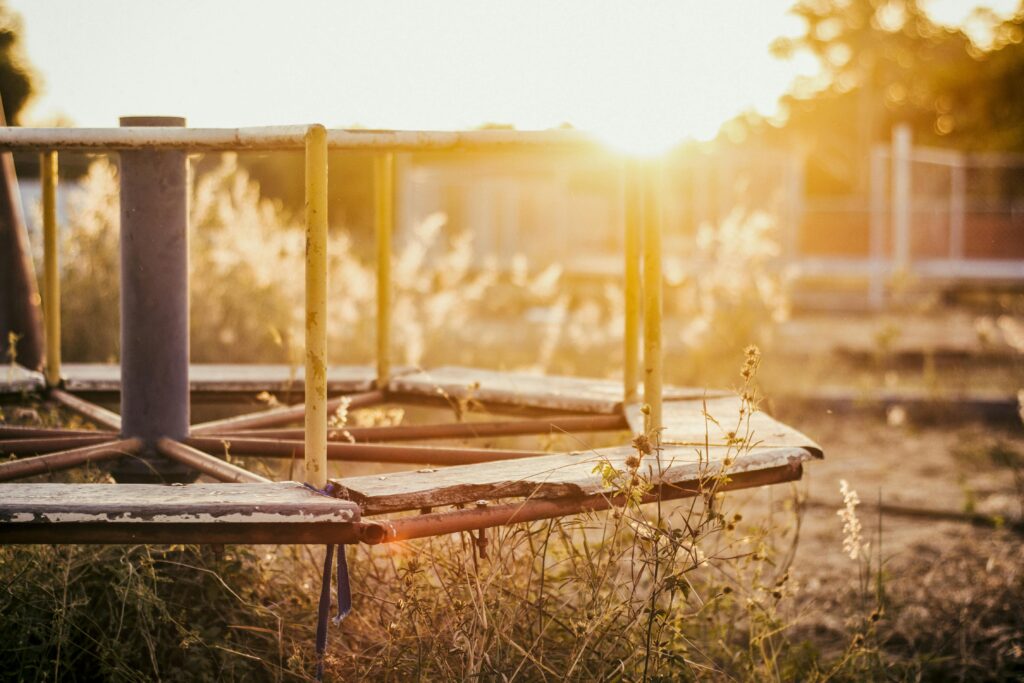There was a playground near Jessie’s school. It was a sad, neglected place. The swings hung loose by a single chain. You couldn’t really sit in them. The slide was warped and would dump you off to the left halfway down. The bars on the other equipment were rusty or completely missing. Weeds grew up where there used to be a sandbox.

Jessie didn’t like the playground very much. It was a place Jessie avoided. And Jessie wasn’t alone. No one really spent any time at the playground. It was a sad, scary, neglected place.
One day, Jessie went to visit a friend who lived in another part of town. Jessie’s friend Cassidy excitedly asked if Jessie wanted to go to the playground. Jessie made a disgusted face and said no. Cassidy didn’t understand, but they did something else fun instead.
When Jessie visited grandparents, they sometimes asked if Jessie wanted to go to the playground down the street. Jessie always declined. Neither Jessie nor the grandparents could figure out why the other was so weird. What kid doesn’t like a playground? Jessie’s grandparents wondered. And Jessie thought, Why would my grandparents want to take me to that scary abandoned place? But nobody wanted to press the issue.
Then, while they were driving to get ice cream or some other important errand, Jessie’s grandparents happened to drive past the playground near their house. Jessie was in the car, looking out the window (miraculously) and not down at some kind of screen. When Jessie saw the bright colors of the playground equipment and the other children playing and having fun, Jessie’s eyes lit up.
“Can we go there!?” Jessie asked excitedly.
“I thought you didn’t like the playground,” Jessie’s grandparents said.
And after a moment of confusion all around, they went to the playground and Jessie had a grand time. (Don’t worry… They still got ice cream.)
When we get an idea of a word in our heads, sometimes we mistake a word for an experience. “Playground” can conjure up ideas of a scary, dilapidated, neglected place. But that was just one experience of a playground. A playground can be a lot of different things, some of them cheerful, fun, and exciting.
We often wrestle with words when what we really need to address is an experience. Our Unitarian and Universalist ancestors wrestled with words too. Like the word sin. Although many of them rejected the idea that people needed to worry about sinning against God, they recognized that people do indeed sin against one another. We do things that cause harm. It matters how we repair things. Our spiritual ancestors saw that as important spiritual work. So they kept the word and clarified what that word meant to them.
Some people today may not like the word sin. The word might conjure up some experience that keeps them from imagining a meaningful use for such a word. So, we say we “forgive and make amends when we hurt one another.” We use words like “rupture and repair.” We talk about cleaning up our messes. Or we use some other language that makes it safe to talk about how we don’t always treat one another well, and we’re responsible for what we do to honor our connection—our interdependence—when we get it wrong. We could just say “sin” or “atonement” and invite new meaning and experiences for some of those charged words. They might not have to mean what we’ve made them mean in the past.
Not every playground is a sad, neglected place. Not every church is a place of judgment and shame. And avoiding a word doesn’t invite us into deeper understanding. What words would be meaningful for you to reclaim or redefine?
Share this post: